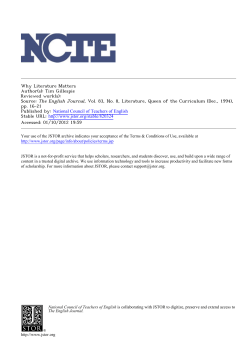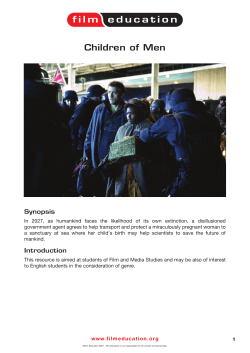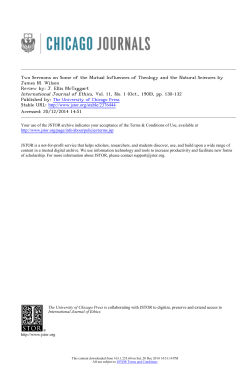
SF-TH Inc
SF-TH Inc
The Ships Landed Long Ago: Afrofuturism and Black SF
Author(s): Mark Bould
Reviewed work(s):
Source: Science Fiction Studies, Vol. 34, No. 2, Afrofuturism (Jul., 2007), pp. 177-186
Published by: SF-TH Inc
Stable URL: http://www.jstor.org/stable/4241520 .
Accessed: 30/06/2012 09:16
Your use of the JSTOR archive indicates your acceptance of the Terms & Conditions of Use, available at .
http://www.jstor.org/page/info/about/policies/terms.jsp
.
JSTOR is a not-for-profit service that helps scholars, researchers, and students discover, use, and build upon a wide range of
content in a trusted digital archive. We use information technology and tools to increase productivity and facilitate new forms
of scholarship. For more information about JSTOR, please contact support@jstor.org.
.
SF-TH Inc is collaborating with JSTOR to digitize, preserve and extend access to Science Fiction Studies.
http://www.jstor.org
AFROFUTURISMAND BLACK SF
177
Mark Bould
The Ships LandedLong Ago: Afrofuturismand Black SF
Whoputus in a raceandforwhatpurposearewe racing?-Rammellzee
From the 1950s onwards,sf in the US magazineand paperbacktradition
postulatedandpresumeda color-blindfuture,generallydepictinghumankind
"as one race, which has emerged from an unhappy past of racial
and conflicts"(James47; see also Kilgore).This shared
misunderstandings
assumptionaccountsfor the relativeabsenceof peopleof colorfromsuchsf:
if racewas going to proveunimportant,
why even botherthinkingaboutit,
whenenergiescouldinsteadbe devotedto morepressingmatters,suchas how
to colonizethe solarsystemor builda betterrobot?Andso questionsof race
remainedas marginalized
asblackcharacters-atbest,it seemed,Chewbacca's
Jimto Han'sHuck.A yearafterStarWars,DC ComicsputSupermanin the
ring with MuhammadAli and then concocteda convolutednarrativethat
culminatedin the speedydeclarationof Ali's victoryby a technicalknockout
thewell-whupped
Manof Steelrefusedto hit
as, strippedof his superpowers,
the canvas(untila splitsecondafterthe refereeannouncedthe result).
The exclusionof peopleof color fromsf's futurehadalreadybeennoted
by, amongothers,Gil Scott-Heron,whose 1970track"Whiteyon theMoon"
(1970)contraststhecorporateprofiteering
of theUS spaceprogram(so close,
ideologically, to much of the Campbell-Heinleintradition)with the
impoverishment
of blackurbancommunities:"I can'tpay no doctorbill (but
Whitey'son themoon)/TenyearsfromnowI'll be payin'still(whileWhitey's
on themoon)."Thespaceraceshowedus whichracespacewasfor. Thissense
of exclusionevenregisteredin white-authored
sf. Forexample,in "Survival,"
a 1971 episode of UFO (1970-73), CommanderStraker(Ed Bishop)-the
white,Americanheadof SHADO,a secretmilitaryorganization
chargedwith
defendingEarthfrom alien invaders-believeswhite Colonel Paul Foster
(MichaelBillington)to be deadandso offerscommandof thevitalmoonbase
to LieutenantMarkBradley(HarryBaird).Initially,this West-Indian
officer
turnsdownthepromotion,sayingthatStrakerhasdonehis dutyby offeringthe
job to the nextmostseniorman,eventhoughhe is black,andthathe himself
has done his duty by refusingit. When Strakerdemandsan explanation,
Bradleyindicateshis skincolor. Straker-perhapsforgettingthatthe seriesis
set in 1980, less thana decadein the future-responds,"Don'tgive me that.
Racialprejudiceburneditself out five yearsago.""Howwouldyou know?"
Bradleydemands.
Whatevertheirintentions,sf's color-blindfuturewas concoctedby whites
andexcludedpeopleof coloras full subjects;andbecauseof theparticularities
of US history,themostobviousomissionwasthatsignificantproportion
of the
populationdescendedfromthe survivorsof the West-Africangenocide,the
MiddlePassage, and slavery. This is not to say that the dominantUS sf
178
SCIENCEFICTIONSTUDIES,VOLUME34 (2007)
traditiondid not occasionallyattempt,withvaryingdegreesof equivocation,
to considerissuesof raceandprejudicein contemporary
andfutureworlds.For
example,AllenDe Graeff'sHumanand OtherBeings(1963)collectssixteen
suchstories,publishedbetween1949and1961,by RaymondE. Banks,Leigh
Brackett,Ray Bradbury,FredricBrown, TheodoreR. Cogswell, C.M.
Kornbluth,GeorgeP. Elliott,J.T. McIntosh,FrederikPohl, MackReynolds,
Eric FrankRussell, RobertSheckley,EvelynE. Smith,WilliamTenn, and
RichardWilson.'It is not insignificant,though,thatonly one-thirdof these
stories addressedthe position of African Americanswith anythinglike
directness;only two or threeof themcouldbe seen to have blackviewpoint
characters,despitethe growthof the Civil Rightsmovementin the 1950sand
such high-profileevents as McLaurinvs. OklahamaStateRegents(1951),
Sweattvs. Painter(1951), the announceddesegregationof the US Army
(1951), Brownvs. the Boardof Education(1954), themurderof EmmettTill
(1955),theMontgomery
BusBoycott(1955-56),andthedesegregation
of Little
Rock(1957).
This problem,too, is perhapsbest addressedby a marginalblack sf
characterfromthe 1970s.In 1972,MarvelComicslaunchedLukeCage,Hero
for Hire(laterLukeCage,PowerMan).LongbeforeRobertMoralesandKyle
Baker'swonderfulTruth:Red, WhiteandBlack(2002)reworkedthe Captain
America origin story (reasoningthat if medical experimentshad been
conductedon US soldiers in the 1940s they would have been on black
soldiers),LukeCage openedwith Lucas,a blackprisonerimprisonedfor a
crime he did not commit,consentingto be the subjectof an experimental
treatmentin orderto helpswaya paroleboard.Whena racistguardsabotages
the procedure,Lucas undergoesa remarkabletransformation.
His already
muscularphysiquebecomeshypermuscular,
hisbodymassincreasesindensity,
andhis skinbecomesas hardas steel.He bustsoutof prison,punchinghis way
throughits walls.Backin New York,he triesto clearhis namewhileworking
as hiredmuscle,Shaft-likedetective,andragingblackRobinHood.He fmds
himself embroiledwith various white superheroes:Iron Man, who, as
billionaireTony Stark,fmancedthe experimentthat createdhim, and the
FantasticFour,whoseskyscraper
headquarters
belongsto anentirelydifferent
worldfromhis run-downoffice over a TimesSquaremovietheater.
In a comic whoseunabashed
linkingof discrepanciesof wealth,prestige,
and access to technologywith skin color providesno more analysisof the
situationthanone wouldfind in mostblaxploitation
moviesof the period,it
nonethelesspowerfullyarticulates
thealienatedblackidentitythatW.E.B. Du
Bois and FrantzFanon describedin terms of double consciousnessand
colonizedsubjectivity.WeneverknowLucas'ssurname,andtheonehe adopts
alludesto an imprisonment
he feels eventhoughno longerincarcerated.
From
the momentLucasbecomesLukeCagehe is alwaysLukeCage. For all that
he mustconceala pastfromwhichhe cannotescape,he has no conventional
off-dutysecretidentityto protect,no maskto puton or takeoff. He is always
visiblein therolehe mustplayto survive.Moreover,despitehis superpowers,
he does not feel thathe is a superhero.Rather,as he musesin issue2 (1972),
AFROFUTURISMAND BLACK SF
179
superheroingis "one line 'a work where powers like mine seem natural,"the
one chance this big, black man has of passing. (Contemplatinga change of
sobriquetin issue 17 [1974], he rejects "Ace of Spades" as "too ethnic.") As
his superpowersconsist of hitting things really hard, while withstandingbeing
hit really hard, he embracesthis stereotypeof black masculinity, occasionally
chiding himself for betraying his intelligence (although fortunately his
performance of black male rage is so convincing that his opponents, and
perhaps his readers, rarely notice that he also outsmarts them). In issue 9
(1973), Cage makes his way to Latveria, where Doctor Doom's robot slaves,
led by the alien Faceless One, are in armed revolt. The Faceless One seeks
Cage's help: "The plight of these machines is heart-rending, Cage. Other
countrieshave, in the past, importedslaves ... but Doctor Doom manufactures
his! Surely you can comprehendtheir feelings?" Cage replies: "Don't play that
song for me, darlin'-I can dig it right enough!-But jivin' don't hook Luke
Cage, an' you couldn't care less 'bout American history!"
Just as LieutenantBradley points to white ignoranceof black subjectivity,
the oppressor's ignorance of the oppressed's life, so Luke Cage points to the
problem of sf that uses the indirection of metaphor or allegory to consider
issues of race and prejudice. Just as the Faceless One elides all experiences of
slavery, thus stripping both fictional robots and real African Americans of
specific identitiesand histories, so the satiricalsf tale in which the alien or the
android is the subject of prejudice, whatever its merits, also avoids direct
engagement with the realities of racializedhierarchiesand oppressions. This
is evident in the brief discussion of race and sf offered by Scholes and Rabkin
in the 1970s:
because of their orientationtowardthe future, science fiction writers frequently
assumed that America's major problem in this area-black/white
relations-would improve or even wither away.... The presence of unhuman
races, aliens, and robots, certainlymakes the differencesbetween humanraces
seem appropriatelytrivial, and one of the achievementsof science fiction has
been its emphasison just this featureof humanexistence.... [Its] tacit attackon
racial stereotyping... has allowed science fiction to get beyond even "liberal"
attitudes, to make stereotyping itself an obsolete device and the matterof race
comparativelyunimportant.Science fiction, in fact, has taken the question so
spiritedlydebatedby the foundingfathersof the United States-of whetherthe
rightsof man includedblack slaves as well as white slave-owners-and raised it
to a higherpower by asking whetherthe rightsof being end at the boundariesof
the humanrace. (188-89, emphasisadded)
While Scholes and Rabkinare clearly involved in the importantstruggle to get
sf recognized as being worthyof academicstudy-their book was publishedby
Oxford University Press-and thus might be merely over-egging the pudding
in the battlefor acceptance,this passage is nonethelessredolentof the criticism
of the genre that accepts the genre's own self-image, promulgatedin the pulps
and some fandoms, as somehow being in the vanguardof literaturebecause of
the supposedly more objective stance enabled by its affiliations to science,
particularly the longer and broader perspectives opened up by the
180
SCIENCE FICTIONSTUDIES, VOLUME 34 (2007)
contemplationof cosmic space and time. The problem with such a gesture, of
course, is that ratherthan putting aside trivial and earthly things, it validates
and normalizes very specific ideological and material perspectives, enabling
discussions of race and prejudiceon a level of abstractionwhile stifling a more
important discussion about real, material conditions, both historical and
contemporary.And by presentingracism as an insanity that burned itself out,
or as the obvious folly of the ignorant and impoverished who would be left
behind by the genre's brave new futures, sf avoids confrontingthe structures
of racism and its own complicity in them.
EdwardJames, in his rathermore nuancedessay quotedabove, found "the
message that humanity is one race" perpetuated without any fuss or
foregrounding in a sample of stories from 1990. "We may trust," he
concludes, "this is a hopeful sign" (47). Slavoj iziek's critique of
multiculturalismsuggests that this is unduly optimistic. Multiculturalism,he
argues, is
a disavowed, inverted, self-referential form of racism, a "racism with a
distance"-it "respects"the Other's identity, conceiving the Other as a selfenclosed "authentic" community towards which he, the multiculturalist,
maintains a distance rendered possible by his privileged universal position.
Multiculturalism is a racism which empties its own position of all positive
content (the multiculturalistis not a direct racist, he doesn't oppose to the Other
theparticular values of his own culture), but nonethelessretainsthis position as
the privileged emptypoint of universalityfrom which one is able to appreciate
(and depreciate)properlyother particularcultures-the multiculturalistrespect
for the Other's specificity is the very form of assertingone's own superiority.
(44, emphases in original)
Sf's color-blind future is multiculturalistin this way-as is evident when
CommanderStraker, who has profoundly missed the point, tells Lieutenant
Bradley, "I don't care if you're polka dot with red stripes, you're the best man
for the job."2
The term "Afrofuturism"is normallyattributedto MarkDery, coined in an
interview with Samuel Delany, Greg Tate, and Tricia Rose that appearedin
South Atlantic Quarterlyin 1993, but even without this term to hand, Mark
Sinker was outlining a specifically black sf in the pages of The Wirethe year
before. To many readers of SFS, Sinker's pantheon of black sf-which
includedSamuelDelany and OctaviaButler, as well as Sun Ra, Public Enemy,
John Coltrane, Anthony Braxton, Miles Davis, Wayne Shorter,Jimi Hendrix,
Afrika Bambaataa,Ishmael Reed, and EarthWind and Fire-might not sound
much like the sf we know. But sf is "a point of culturaldeparture"for all of
these writers and musicians, because "it allows for a series of worst-case
futures-of hells-on-Earthandbeing in them-which are woven into every kind
of everyday present reality" ("Loving the Alien"). The "centralfact" of the
black sf they produce "is an acknowledgement that Apocalypse already
happened," that, in Public Enemy's words, "Armageddonbeen in effect."
AFROFUTURISM
ANDBLACK
SF
181
Takingin contemporary
music and sf, Sinkerpositionship-hopin "the
grand syncretic traditionof bebop, not ashamedto acknowledgethat
technologicalmeansandinitialbuildingmaterialarealwayssimplywhatfalls
to hand:but thatmeaningis nonethelessa matterof energeticandvisionary
notwhofirstownedormadethisorthatfragment"
redeployment,
("Lovingthe
hastypicallybeendiscussedintermsof European
Alien").Althoughcyberpunk
or Burroughsian
detournement
avant-garde
cut-up,its parallelsandaffinities
Sinkerdoes
withbebopandhip-hop3have generallygone unacknowledged.
more thanmerelypoint to this omission,however.Just as ThomasFoster
arguesthatcyberpunk"didn'tso muchdie as experiencea sea changeintoa
moregeneralizedculturalformation"
(xiv), so Sinkersuggeststhattheblack,
of thesemusicalforms
urban,proletarian
experiencecentraltothedevelopment
speaksdirectlyto the experienceof the global underclasscreatedby the
with
intertwined
logicsof capital,Empire,andrace:more-or-lessconcomitant
thegrowthof hip-hop,cyberpunk,the "radicalleadingedge"of "whiteSF,"
was "arguingthattheplanet,alreadyturnedBlack,mustembraceratherthan
resist this [relationshipto technology]:that ... only ways of technological
inheritedfromthejazz andnowtherapavantgardecanreintegrate
interaction
humanitywiththe runawaymachineage."
WhileExtropians,
andotherrichwhiteguyscanreimagine
Transhumanists,
white flight not in terms of suburbs, gated communities,or "off-world
colonies," but of libertarian,pro-market,digital disembodiment,the
canonlyplayin theruinsthey
overwhelming
majorityof theglobalpopulation
leave behind.In musicalterms,this is signifiedby DetroitTechno, which
"yearn[ed]for [the] impossibleSF futures"projectedby Kraftwerk'ssemiironiccelebrationof "theexcellenceof robot-being,"but whose consumers
couldonly find "purelytemporaryparadisiacfreedom,beyondsex rulesor
in the "wordlesstotalimmersioncultureof beat-pleasure."4
racialboundaries"
In sf terms,thisutopianimpulseis suggestedby thedance-party
in Zionwhile
tunnelingSentinelspreparefor a final onslaughtthat will universalisethe
Matrix.Blacknessas a signifierof the multiethnicunderclass,as well as an
increasinglycommodifiedimageof resistance,is signalledby thepresencein
TheMatrix(1999)andits sequelsof KeanuReeves,a Lebanon-born
Canadian
Asian-Pacific,passingas white,castinsteadof a blackman(WillSmith),who
fights like a Chinese(specifically,Jet Li), and desperatelywantsto be as
black-as cool-as LaurenceFishburne.
Just as the Sentinelsseek to eradicatethe Zionites,so westernculture
generallyconstructs"Blackness... as alwaysoppositionalto technologically
drivenchroniclesof progress"(Nelson 1). This is evident,for example,in
such a quintessentially
sf story as Tom Godwin's "The Cold Equations"
(1954). While much of the criticism of this story has focused on its
constructionof a newer and higher frontieras a space of transcendent
masculinity,andof femininityas thatwhichmustbe ejected,theonecolonized
personwho fleetinglyappearsin it-the Gelanese"nativegirl who does the
cleaningin theShip'ssupplyoffice"(445)-has gonelargelyunnoticed.While
182
SCIENCEFICTIONSTUDIES,VOLUME34 (2007)
the manly colonists do all they can to allow the white girl, Marilyn,an
existencein theirspace,howeverbriefly,the "nativegirl"is utterlyexcluded.
fictionthattreatsAfricanAfrofuturism,
describedby Deryas "speculative
concernsin the contextof
AmericanthemesandaddressesAfrican-American
20th_centurytechnoculture-and, more generally, African-American
significationthat appropriatesimages of technologyand a prosthetically
enhancedfuture"(736), is not restrictedto imagesof exclusionfromwhite
technologicalprogress,becauseonly withina certainideologicalfieldis black
experiencethe oppositeof technoculture.Just as the futuresof "TheCold
Equations"and UFOexcludethe experienceof the subalternfromtheirselfperception, so Mark Bradley and Luke Cage's resistancesto certain
indicate-evenif theystruggleto imagine-a muchmorevaried
interpellations
and complex set of relationshipsbetweendominationand subordination,
whitenessandcolor,ideologyandreality,technologyandrace.Inthiscontext,
thatmuchAfrofuturist
it is notinsignificant
writingfocuseson real-worldblack
access to and use of digitialtechnologies,or that the second @froGEEKS
conferenceshouldshift its emphasisfrom 2004's "FromTechnophobiato
Technophilia"
to 2005's "GlobalBlacknessandthe DigitalPublicSphere."5
Afrofuturism
into
It is not the intentionof this specialissueto incorporate
sf. Afrofuturismis every bit as irreducibleto sf as Bradleyis to SHADO's
whitehierarchy,or blackAmericansto Latverianrobotslaves,or LukeCage
to the buckstereotype.Rather,it is the contentionof this issue thatsf andsf
studies have much to learn from the experienceof technoculturethat
Afrofuturist
textsregisteracrossa widerangeof media;andthatsf studies,if
it is to be at all radical,mustuse its positionof relativeprivilegeto providea
homeforexcludedvoiceswithoutforcingassimilation
uponthem.Resistance,
as the Borg never said, is utile. It would be easy, in a postmodern
multiculturalist
as
age, to fall intothetrapof merelycelebratingAfrofuturism
resistance(and thus practicingthe "disavowed,inverted,self-referential"
racism :iziek describes).In the era of digital sampling-and the shift of
emphasisfromthe diachronicto the synchronicencouragedas muchby late
capitalismas by the linguisticturn-it is easy to lose trackof history.The
future proposed by Marinettiand the Italian Futuristswas young and
masculine,obsessedwithspeedandthe foreclosureof thepast.In its frequent
tendstowardsthetypical
emphasison bridgingthedigitaldivide,Afrofuturism
cyberpunk
acceptanceof capitalismas anunquestionable
universeandworking
for the assimilationof certaincurrentlymarginalizedpeoples into a global
system that might, at best, tolerate some relativelyminor (althoughnot
unimportant)
reforms,but withinwhich the manywill still have to poach,
pilfer, and hide to survive. It is the hope of this issue to bring together
Afrofuturism
andsf studiesin anticipation
of a transformation.
IsiahLavender'sideaof the "ethnoscape"
proposesa new way of looking
at sf. In producingan estrangedworld, the sf authorcan formulatean
imaginary
environment
so as to foreground
theintersection
of race,technology,
andpower;likewise,the readerof any text can transformits contoursby a
similarforegrounding
of thetext'streatment
of thesediscourses.Focusingon
ANDBLACK
AFROFUTURISM
SF
183
the ethnoscapetransformsthe perceivedobject. Afrofuturismcan help sf
studiesto recognizethe ethnoscapesin boththe textsandpracticesit studies,
as well as in thoseit constructsitself.Eachof thearticlesin thisissueperforms
a similartask.
DarrylSmithconsidersshortfictionby W.E.B. Du Bois, AmiriBaraka,
andDerrickBell, signifyingon theimageof thesingularityor spike,inverting
it, so as not to contemplatethe Tip of white, posthuman,post-historical
transcendence
but the Pit of black, material,human,and historicalbeing.
Bouldexaminesa groupof African-American
novelsfromthe 1960sand1970s
thatpostulatea nowthatcannotbe gonebeyond,andthatrespondby tryingto
imaginea blackrevolutionagainstwhitepower.Invertingthe utopianform,
they bringthe readerrightup to the brinkof historicalrupturethat makes
utopiapossiblefrom this side, but are stoppedshortby the immensityof the
ontologicalcataclysmtheir revolutionaryaction must provoke.While not
always superficiallyresemblingsf, these novels are in the vanguardof the
currenttendencyJamesonnotesof "findingvisionsof totaldestruction
andof
theextinctionof life on Earth... moreplausiblethantheUtopianvisionof the
new Jerusalem"(199).
SherrylVint considerstwo novels, Toni Morrison'sBeloved(1987) and
OctaviaButler'sKindred(1979), thatinitiallyretreatfromthe futureso as to
betterunderstandhow to approachit. Criticaltreatmentsof the neo-slave
narrativehavetypicallyneglectedthesignificantuse madeof fantasticdevices
so as to troubleandconfrontthe historyof slaveryin the New World(which
includesits ongoinglegacies).Kindredcanperhapsbe readas an earlythirdwave feministinversionof MargePiercy'slate second-waveWomanon the
Edgeof Time(1976).Inbroadterms,Piercy'snaturalist
slummingwithConnie
Ramostendsto dematerialize
differencethrougha future-orientation
thatcan
reachno furtherintothe pastthanConnie'spresent,andmakesall of future
historyhingeon heragency.Butler(whosenovelis set, in part,in 1976)insists
that presentand futureare inextricablycaughtup with the past. As Vint
demonstrates,Morrison'sgothic confinementsand hauntingssuggest the
importance
of not beingtrappedby history,whileButler'stimetravelargues
againstany precipitateflightfroma historythathas not yet beenadequately
resolved.While Butleris an authorwho has movedfreely amongfantastic
genres, this essay reconceptualizes
her work as always-alreadyneo-slave
narratives.
A similarly deep engagementwith the history of imperialismand
colonialismis evident,JillanaEnteenreveals,in Nalo Hopkinson'sMidnight
Robber(2000), a novelthattells a cyberpunkstoryfromthepointof view of
thecolonizedevenas thecolonizedplaythecolonizersin a planetaryromance.
Hacking and splicing genres as deftly as it does language, telling its
contradictory
tale(s)in NorthAmericanEnglishandTrinidadian
andJamaican
creoles, MidnightRobberactivatesboth sides of history, diggingdeep to
imaginea future.Examiningsonic Afrofuturism,NabeelZuberirevealsan
evenmoretangledhistoricalweavein therefusalof Afrodiasporic
culture,and
musicinparticular,
to dematerialize
intonothingmorethandisembodied
digital
184
SCIENCEFICTIONSTUDIES,VOLUME34 (2007)
For WilliamGibson,
bits in the circulationof globalizedinformation-capital.
dubmighthavebeenmerely"asensuousmosaiccookedfromvastlibrariesof
cultureis embodied-and
digitalizedpop"(104), butas Zuberidemonstrates,
historyis bodies.Andmaybethatcolor-blindfuturecanstillbe toldso longas
it is motley,mottledwithouthierarchy,ratherthanblanketedin whiteness,and
so long as it is toldby thoseandfor thosewho arepropelledtowardsthe Pit
ratherthanthosewho clamberover themto the Tip.
The articlesin this issue bringto our attentiongenerallyneglectedtexts,
someof whichmightconventionally
be consideredas of onlymarginalinterest
to sf, whilealso castingrelativelyfamiliartextsin a new lightby considering
themalongsidenon-or marginally-sftexts. Collectively,theynot only draw
attentionto thewaysin whichsf hastraditionally
beenconstructed
to privilege
whiteAmericanpulp-and-paperback
andEuropeanliterarytraditionsbutalso,
inextricably,to excludeblackvoices andblackexperience.
I wouldlike to thankRaifordGuins,who set the ballrollingandlaterputme
in touchwithRoneShaversat a crucialjuncture;the patientandsympathetic
editorsof SFS;andmy anonymousreader,my hero for hire, whose reports
wereprompt,precise,detailed,andinsightful.
NOTES
1. Davin offers details of numerousother stories that addressedissues of race and
discrimination,anddemonstratessome of the complexityof the genre's liberalismin this
regard. His conclusion, however-that sf in the period he studies (1926-1965) was not
racist-is predicatedon a rathernaive conception of racism that in fact replicates the
exclusionarystructureof sf's color-blindfuture. Recent anthologiesof interestinclude
Hopkinsonand Mehan, and the two edited by Thomas.
2. Bradley, unfortunately,accepts this reassuranceand the promotion,becoming, in
effect, one of AnthonyJoseph's "post-earthnegroes who believed inner:disembodied:
blacknuss"and who
claimedthatblackas a conceptof beingwas onlyeverrelevanton Earth,andeventhen
it wassuspectedas themindsetof a conthatputafrosdownandkeptnegroesterrabound
to suffer/whenwe couldabeen interplanetary
fromway back.Insteadof the industrial
revolution,we could'vehadniggersin space!Theysaidblackwas dead.... Butblack
peopledidn'twantto hearthatshit!'causein theirfollythesefoolsgrewlamelimbsand
underneath
andotherwisetheyappearedimperviousto funk.(37-38)
3. Bebop's relianceon chordprogressionsandon alteringor combiningchords from
two tunes (so as to ditch melodies unsuited to its fast pace, enable improvisation,and
avoid copyright payments) provides a model for hip-hop's scratching and sampling
aesthetic.
4. Key Afrofuturistwritingson music includeEllington, Eshun, Lock, Miller, Rose,
Szwed, Weheliye, and Williams.
5. See, for example, Eglash; Everett; Kevorkian;Kolko, Nakamura,and Rodman;
Nakamura;and Nelson, Tu, and Hines.
WORKSCITED
Davin, Eric Leif. Partners in Wonder:Womenand the Birth of Science Fiction, 19261965. Lanham,MD: Lexington, 2006.
De Graeff, Allen, ed. Humanand OtherBeings. New York: Collier, 1963.
AFROFUTURISMAND BLACK SF
185
Dery, Mark. "Blackto the Future:Interviewswith Samuel R. Delany, Greg Tate, and
Tricia Rose." SouthAtlantic Quarterly 92 (1993): 735-78.
Eglash, Ron. "Race, Sex, and Nerds: From Black Geeks to Asian AmericanHipsters."
Social Text20.2 (Summer2002): 49-64.
Ellington, Duke. "The Race for Space." 1962. TheDuke Ellington Reader. Ed. Mark
Tucker. Oxford: Oxford UP, 1993. 293-97.
Everett,Anna. "TheRevolutionWill Be Digitized: Afrocentricityandthe Digital Public
Sphere." Social Text20.2 (Summer2002): 125-46.
Eshun, Kodwo. More Brilliant Than The Sun: AdventuresIn Sonic Fiction. London:
Quartet, 1998.
Foster, Thomas. The Souls of Cyberfolk: Posthumanism as Vernacular Theory.
Minneapolis:U of MinnesotaP, 2005.
Gibson, William. Neuromancer.New York: Ace, 1984.
Godwin, Tom. "The Cold Equations." 1954. TheAscent of Wonder:The Evolution of
Hard SF. Ed. David G. Hartwelland KathrynCramer.New York: Tor, 1994. 44258.
Hopkinson, Nalo and Uppinder Mehan, eds. So Long Been Dreaming: Postcolonial
Science Fiction and Fantasy. Vancouver:Arsenal Pulp Press, 2004.
James, Edward. "Yellow, Black, Metal andTentacled:The Race Questionin American
Science Fiction." Science Fiction, Social Conflictand War.Ed. PhilipJohnDavies.
Manchester:ManchesterUP, 1990. 26-49.
Jameson, Fredric. Archaeologies of the Future: The Desire Called Utopia and Other
Science Fictions. London: Verso, 2005.
Joseph, Anthony. TheAfrican Origins of UFOs. Cambridge:Salt, 2006.
Kevorkian,Martin. Color Monitors:TheBlack Face of Technologyin America. Ithaca,
NY: Cornell UP, 2006.
Kilgore, De WittDouglas. Astrofuturism:Science, Race, and Visionsof Utopiain Space.
Philadelphia:U of PennsylvaniaP, 2003.
Kolko, Beth E., Lisa Nakamura,and Gilbert B. Rodman, eds. Race in Cyberspace.
London: Routledge, 2000.
Lock, Graham.Blutopia: Visionsof the Futureand Revisions of the Past in the Workof
Sun Ra, Duke Ellington, and AnthonyBraxton. Durham, NC: Duke UP, 2000.
Miller, PaulD. (akaDj SpookythatSubliminalKid). RhythmScience. Cambridge:MIT,
2004.
Morales, Robert, and Kyle Baker. Truth:Red, White & Black. New York: Marvel,
2004.
Nakamura, Lisa. Cybertypes:Race, Ethnicity, and Identity on the Internet. London:
Routledge, 2002.
Nelson, Alondra. "Introduction:FutureTexts." Social Text20.2 (Summer2002): 1-15.
, Thuy Linh N. Tu, and Alicia Headlam Hines, eds. Technicolor: Race,
Technology,and EverydayLife. New York: New York UP, 2001.
Rammellzee. "Iconic Treatise on Gothic Futurism." 6 May 2007. <http://www.
afrofuturism.org/ text/Manifestos/Rammellzee0l.html> .
Rose, Tricia. Black Noise: Rap Music and Black Culturein ContemporaryAmerica.
Hanover:Wesleyan UP, 1994.
Scholes, Robert, and Eric S. Rabkin. Science Fiction: History, Science, Vision. New
York: Oxford UP, 1977.
Scott-Heron,Gil. "Whiteyon the Moon" (1969). Small Talkat 125thand Lenox. Flying
Dutchman, 1970.
186
SCIENCE FICTIONSTUDIES, VOLUME 34 (2007)
Sinker, Mark. "Lovingthe Alien." First publishedin The Wire96 (February1992): 3033. Pulsation.com. 5 May 2007. < http://www.pulsation.com/documents/loving_the
_alien/ >.
Szwed, John F. Space is the Place: TheLife and Timesof SunRa. New York: Pantheon,
1997.
Thomas, Roy, et al. EssentialLukeCage, Power Man, volumeone. New York: Marvel,
2005.
Thomas, Sheree, ed. Dark Matter:A Centuryof SpeculativeFictionfrom the African
Diaspora. New York: Warner,2000.
, ed. Dark Matter:Reading the Bones. New York: Warner,2004.
Weheliye, Alexander. "'Feenin': PosthumanVoices in ContemporaryBlack Popular
Music." Social Text20.2 (Summer2002): 21-47
Williams, Ben. "Black Secret Technology: Detroit Techno and the InformationAge."
Technicolor:Race, Technology,and EverydayLife. Ed. AlondraNelson, Thuy Linh
N. Tu, and Alicia HeadlamHines. New York: New York UP, 2001. 154-76.
i24ek, Slavoj. "Multiculturalism,Or, the CulturalLogic of MultinationalCapitalism."
New Left Review 225 (September-October1997): 28-51.
© Copyright 2025





















